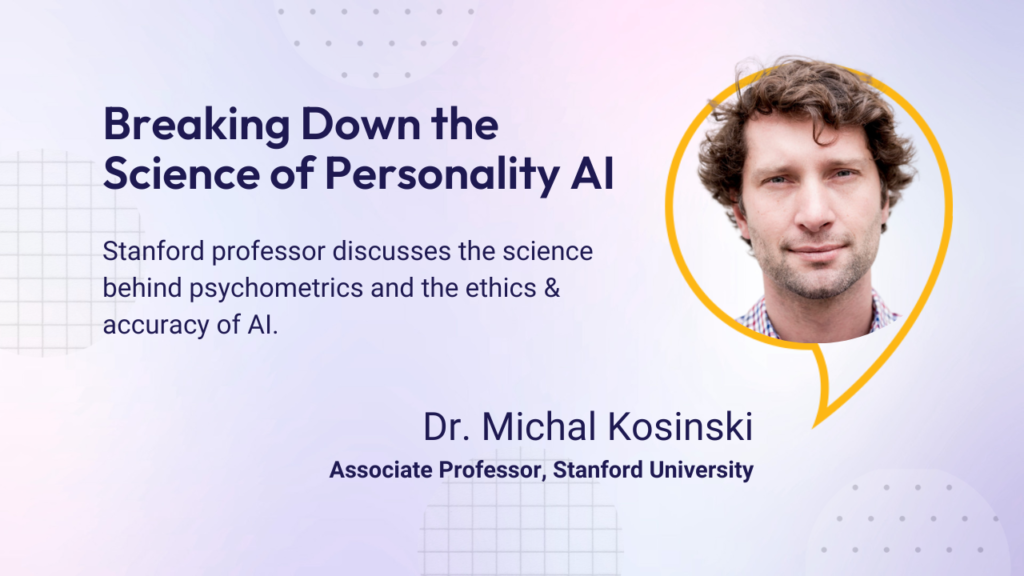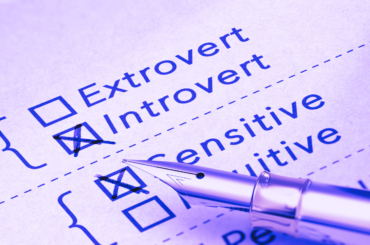Personality AI is incredibly easy to use. We’re not blowing our own trumpet here, that’s what salespeople across all kinds of companies report. In fact, Humantic AI (the leading personality AI for sales tool) is rated 9.7/10 on the ease-of-use scale on G2.
Yet, the underlying science behind Personality AI can be quite hard to grasp. In our latest masterclass, we got Stanford professor Dr. Michal Kosinski to break it down for you.
Michal Kosinski is currently an associate professor of organizational behavior at Stanford University Graduate School of Business. He has published 70 plus papers in this field with 17,000 plus citations.
He was a postdoctoral researcher at Stanford. And before this, he was the deputy director of Cambridge Psychometric Center. He was the first person to flag the Cambridge Analytica incident back in 2016.
Dr. Michal Kosinski explained how AI processes information and accurately describes people based on data. The session also covered computational psychometrics, AI and bias, gaming algorithms and how to use insights to improve buyer experiences.
Without further ado, here are the highlights.
- Introduction to Computational Psychology and Personality AI
- AI Models and Human Behaviour
- Computational Psychometrics and How It Works
- Personality AI vs. Traditional Assessment
- Accuracy of Personality AI
- Anecdotal Evidence is Not Enough to Judge AI
- Psychometrics and Personality AI in Sales
- Impact of Personality Based Personalization
- AI and Bias Prevention
- Gaming Personality AI Algorithms
- Do Personalities Evolve?
- Future of AI Models and Personality AI
Introduction to Computational Psychology and Personality AI
Dr. Michal is a computational psychologist who uses computational methods such as AI or machine learning models and big data to understand humans better. Given how our lives are increasingly migrating to digital environments, and in the process leaving an increasing amount of digital footprints, Michal jokes that it’s an easy time to be a scientist like him.
While psychologists, medical professionals and many other scientists are using different ways to understand humans, computational psychology is just one avenue that is Dr. Michal’s area of specialization.
AI Models and Human Behaviour
There’s an explosion of availability of new computational models and data that can be looked at and examined to learn something about people that generate this data. In recent years, there’s a new wonderful phenomenon — we are increasingly being surrounded by complex and powerful neural networks, language models such as GPT-3.
We cannot really derive the functioning of such models from their design, Michal adds. The engineers who design those models are themselves impressed by how wonderful and powerful those models are. But they’re also surprised by the fact that the models suffer from racial or gender biases, and make mistakes similar to humans.
My thinking is that we could use the same tools that psychologists have been using to study human beings. We could try to understand and study the behavior of AI by simply observing its behavior and putting it in psychological experiments, administering psychological questionnaires, and so on. This is something that I’ve been excited about recently.
Computational Psychometrics and How It Works
Computational psychometrics, or psychometrics in general, is a science of psychological measurement. Traditionally done through questionnaires, they help measure things like personality — people’s tendency to behave in certain ways, like for example, extroverts or introverts.
With AI, you could use publicly available data to understand the personality of a human by asking them different scenarios and judging how they respond. With such questions, we get to understand the type of jobs they would love, the type of choices they would make, how they like to be sold, and maybe even what type of partner they would like to be with. We can use someone’s digital footprint to understand them better. The possibilities are endless.
Personality AI vs. Traditional Assessment
The traditional assessment method to assess a personality is to use questionnaires. We may ask questions like how often do you socialize? Do you like poetry or are you liberal?
But then recently, maybe 10 or 15 years ago, psychometricians realized that instead of asking people how often they read poetry, we could just ask people to share their digital footprints. Those digital footprints will reveal how often they actually read poetry.
Instead of asking people how often they socialize, one can very easily extract this information from people’s Facebook or LinkedIn profiles by counting the number or intensity of social connections and interactions and so on.
An explosion of computational models were developed that analyzed people’s digital footprints, Facebook status updates, Facebook likes, tweets, LinkedIn behavior, and translated them into accurate predictions about their behavioral tendencies, intimate traits, opinions, views and preferences.
- Pros: This carries huge benefits such as we can improve products and services. We can match people with jobs and careers that they would like. We can allow people to have more self insights to understand themselves better.
- Cons: It also carries risks like the Cambridge Analytica incident. You can extract private information about people and use it to manipulate their opinions, their votes, and so on. So, like many other technologies, this technology can be used ethically for people’s benefits and unethically too.
Accuracy of Personality AI
Before the Cambridge Analytica incident, they claimed that they were very accurate. And then when they realized that they’re breaking laws, and people are getting upset, they said it’s inaccurate.
What I can tell for sure is that it’s very easy to be accurate. You can predict people’s personality from just a few of their digital footprints with accuracy that is virtually unachievable in other ways.
If we ask your work colleagues, people who spend 8 hours a day with you for years, to assess your personality using a questionnaire, their accuracy is going to be only as high as what a very simple algorithm can extract from ten Facebook likes.
Now, to outperform your friends and family members, you may need 100 or 150 likes. At 300 likes, an algorithm can extract and predict your future behavior with more accuracy than your own spouse. That’s how amazing this can be.
Anecdotal Evidence is Not Enough to Judge AI
We can point out situations where AI is not accurate to judge a person. We can also point out situations where the person claims that the AI is not accurate but it actually is.
What matters is the overall average accuracy. And what millions of data points show is that AI based predictions are depictive of future behavior.
Bottom line, computers are more accurate than humans. In 1954, there was a very famous book published in psychology, which was about actuarial predictions. Machines will always outperform human predictions in things such as psychiatric diagnosis or clinical psychological diagnosis.
Psychometrics and Personality AI in Sales
Personality obviously plays a huge role in sales. Now let’s assume cars — there are different types of cars made by different makers. And to market them, companies adopt different strategies.
If we want to make a huge impact on a customer, then we can do it through a car salesman who uses personality hacks that help in gaining the trust of his customers to maximize the likelihood of selling the car.
According to a data analysis, we found that when a car salesman adjusts his communication according to the personality of a buyer, then the chances of a buyer buying the car is extremely high.
It is not just about selling the product but it is also making the customer feel happy. It’s important to make a customer feel that they are respected and that their problems are solved and that the seller really cares for them.
Impact of Personality Based Personalization
In one of our studies, we tried to derive the personality of a person from a single like. On running personalized ads to the customers based on personality, by matching the marketing message with the customer’s personality, we saw a boost in sales by 50-75 per cent. And we could get this from just one Facebook like! And this is just a crude assessment. Not even a detailed assessment of the personality.
Modifying one’s communication in recognition of individual differences between people or differences between organizations as well is just not only a good business practice because it boosts sales and customer satisfaction, but it’s also a sign of respect.
Why do you think people go to Google? They go to Google because they have a specific query and Google gives them a specific response based on that query. That’s why maybe people don’t go to Yahoo because Yahoo offers them a lot of links which Yahoo thinks is right.
However, Google always opts for a personalized result based on the query. Likewise, Netflix also offers its customers different personalized viewing choices which makes the viewer want to keep exploring more of their content.
Dr. Michal adds “I hope that we will have more of that in interpersonal or algorithm to person communication in digital spaces as well.”
AI and Bias Prevention
Psychology proves that it is extremely difficult for a person not to have bias. But humans can still train themselves to prevent such bias coming out.
So when we started creating data science models, we realized it was important not to hide data from algorithms — say the gender of a candidate in a software that is used by a hiring manager. It’s because the algorithm can easily find the gender of a person by comparing other data sets.
What should be instead done is to instruct the algorithm not to have its own set of biases and treat the candidates equally in whatever task it needs to perform.
In my experience of auditing algorithms, I feel it is better not to just focus on making an algorithm perfect but instead try comparing the algorithm with the best alternative (because no algorithm can ever be perfect). An obvious best alternative is human decision making – but again humans are inaccurate too!
Gaming Personality AI Algorithms
We can try to game the algorithm but overtime the algorithm will catch different signals and data that we as humans might pass on and this helps the algorithm to improve their predictions. It can focus on points that might seem insignificant to humans.
If someone wants to game the algorithm by posting random things on their digital footprint, AI is also capable of seeing through the noise.
Even if people do alter their responses, then they do it in a very predictable way like their personalities. Extroverts like being extroverts. Liberals like being with liberals. Data shows that typically, people are happy with their own behavior.
Do Personalities Evolve?
Without a doubt, personalities evolve.
As babies or infants, we have certain basic personalities. They are not very visible at the early stages. But as we go through our life, we are receptive to the social cues when we interact with our parents or relatives. And as we age, we become an adult who is agreeable or disagreeable, facing different personality explosions. They become more pronounced.
Another thing is when we grow, we surround ourselves with people like us. We are bound to interact with similar people who help us amplify our personality as we go through life.
Another way personality evolves is through traumatic events or through years of self work on self improvement. But this is happening at a glacial speed. We can’t change the underlying traits so easily.
Future of AI Models and Personality AI
Tools such as ChatGPT or DALL.E have given extraordinary results and will modify how we consume content. For example, if you ask ChatGPT to summarize the French revolution for a five-year-old, then it can do it for you.
The way we consume information is going to change. If you read an article, we can ask the AI to read it for you or if you’re someone who likes detailed articles, it can even make it longer by adding more information which we may not be aware of.
We’re at the very beginning of this technology but it’s already showing great results.
Technology has shown to disconnect people, but we also see an opportunity here to bring people together by helping us understand other people better.
Personality AI has the potential to impact not just sales but perhaps even a new internet that brings people closer and not further apart.



